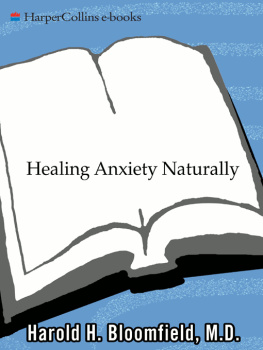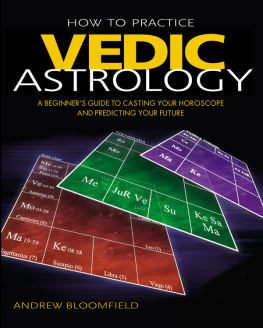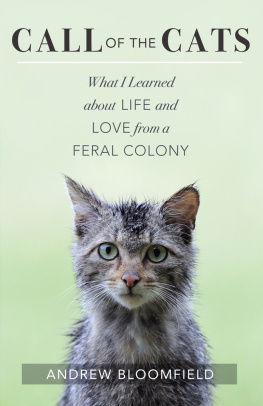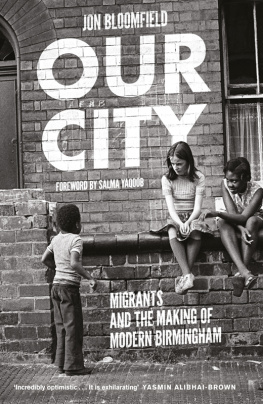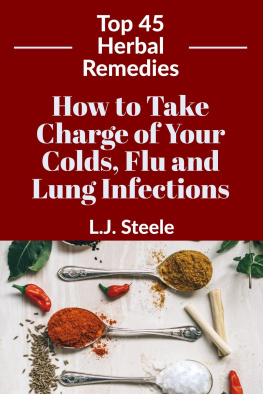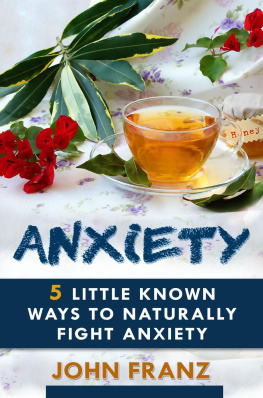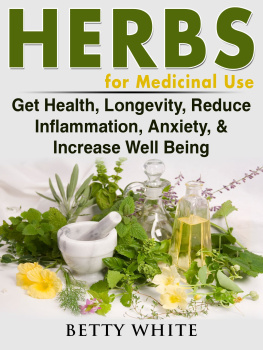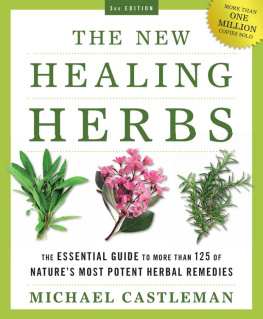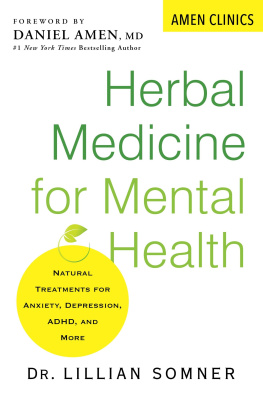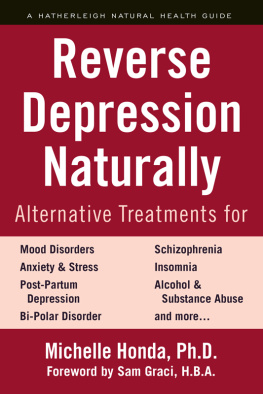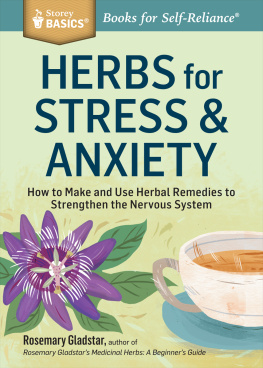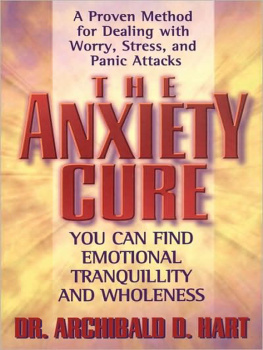Harold H. Bloomfield, M.D.
The Lord hath created medicines out of the earth, and he that is wise will not abhor them.
READ THIS FIRST
This book is not intended to be a guide for self-medication. A reliable diagnosis can only be made by a physician. For this reason professional advice should always be sought before undertaking self-administered herbal therapy. Only in this way can you make safe use of the beneficial effects of herbs.
Healing Anxiety Naturally is intended to be educational and is in no way a substitute for advice from a physician or mental health professional. Always verify with your doctor the correct dosage before taking any natural remedy described in this book. Never administer any remedy to a child without a physicians advice. Herbs can interact with other drugs you are taking or have adverse effects themselves. If you are currently taking prescription medication for anxiety, please do not change your dosage without medical guidance. If you are taking a prescription tranquilizer, sleeping pill, or antidepressant and suddenly stop, withdrawal symptoms can be severe.
More medical research is necessary to chart the applications, usefulness, and limitations of herbal therapy for anxiety more precisely and reliably. The author and publisher expressly disclaim responsibility for any negative effects directly or indirectly attributable to the use or application of any information contained in this book.
Vis medicatrix naturae. (Honor the healing power of nature.)
Hippocrates
Anxious? Stressed? Have difficulty calming yourself into a deep, natural sleep? Well, you are not alone. Over sixty-five million Americans suffer annually from anxiety, chronic stress, and insomnia. Until recently the only option for many was prescription antianxiety and sleeping pills. But these drugs can bring with them impaired memory, loss of concentration, poor quality of sleep, addiction, and withdrawal symptoms. Remarkably safe, highly effective herbal medicines are revolutionizing the treatment of mild to moderate anxiety, depression, and insomnia. These natural remedies are available without a prescription and are free of the side effects and addiction potential associated with synthetic drugs. Mounting scientific evidence, including studies published in the Journal of the American Medical Association, New England Journal of Medicine, British Medical Journal, and other leading periodicals, is documenting the validity, safetyand increasing popularityof herbal medicines.
While herbs have been valued as folk remedies since ancient times, modern medical science has only recently confirmed their healing properties. Kava, a natural tranquilizer, does not have the side effects of Valium-like benzodiazepines (such as Xanax and Klonopin) but can be a more effective cure for the millions of people with mild to moderate anxiety. Hypericum (Saint-Johns-wort), which can be just as effective as synthetic antidepressants for depression, can also help reduce anxiety and maintain emotional harmony. Valerian, a natural herbal sedative, can provide a good nights sleep without the morning hangover or rebound insomnia of prescription sleeping pills such as Dalmane, Halcion, and Restoril. Ginkgo biloba is a brain booster that should be considered as a daily supplement by anyone over the age of forty dealing with the angst of aging. Adaptogenic herbs, like ginseng, eleuthero, and ashwaganda, can help strengthen the nervous system and protect against stress. Aromatherapy is being used in Europe to calm patients before surgery and in the treatment of attention deficit disorder.
Healing Anxiety Naturally provides specific information that will allow you, in consultation with your health care professional, to make an informed choice about whether you need treatment for anxiety and how herbal medicines can be used for healing. Herbal remedies are only appropriate for mild to moderate anxiety, not severe cases. Synthetic drugs are necessary and helpful for major anxiety disorders. I still write prescriptions, but, as I can attest, natural healing is best.
I have wanted to be a physician and psychiatrist ever since I can remember. I identify proudly with the great Greek physician Hippocrates (460377 B.C .), the father of medicine, who regularly prescribed herbal medicines for nervous unrest. So it is a great sadness for me to point out a tragic flaw in modern medicines treatment of anxiety. Pharmaceutical companies warn, in the drug packaging inserts for benzodiazepine tranquilizers (Xanax, Valium, Klonopin, and Ativan) and sleeping pills (Restoril, Dalmane, Serax, and Halcion) that these drugs are not to be used for longer than three weeks, because they rapidly become addictive. Often they create rebound anxiety and insomnia when withdrawn. Yet many physicians routinely renew these prescriptions for months and even years. Millions of people have become addicted to these legal prescription drugs, more than the total number who abuse heroin and cocaine. Hundreds of thousands of people suffer from memory loss, poor concentration, and imbalance as side effects of these drugs, resulting in tens of thousands of automobile accidents, hip fractures from falls, and unnecessary deaths.
Every day I get heart-wrenching phone calls from patients who have suffered physically, emotionally, and financially from doctors relentlessly pushing these drugs upon them. These patients have frequently been told that they have no other choice but to continue to take benzodiazepines over the long term. They bitterly complain that their doctors just write prescriptions and dont suggest any means by which patients can help themselves. When patients inquire if their anxiety can be treated with herbal medicines, they are often met with cynicism. In medical offices and clinics, millions of people are crippled annually, not by their anxiety but by a reflexive take-this-prescription mentality. This further disempowers the anxious person and can interfere with true healing.
The physician is only natures assistant.
Galen
What compounds these human tragedies is that they are avoidable. Europeans already use herbal tranquilizers and sleep aids more frequently than prescription drugs. America is significantly behind Germany, France, and England in the use of herbal medicines to heal anxiety, because of a lack of information in America about their proven medical effectiveness. Whereas German physicians are trained in the use of herbs during medical school, and over three-fourths of German doctors prescribe them in their practice, most American physicians continue to write prescriptions for tranquilizers and sleeping pills routinely, without knowledge of these safer natural alternatives.
Antianxiety drugs are a multibillion-dollar business. The pharmaceutical industry helps underwrite medical journals, professional meetings, and drug representatives who bring free samples to doctors offices. While there is a huge profit incentive for developing and testing a new synthetic tranquilizer or antidepressant drug, there is no economic incentive for U.S. companies to research an herbal medicine alternative, because a plant remedy cannot be patented.
The growing popularity of herbs has been primarily a consumer-led revolution. The new field of phytomedicine (plant medicine) subjects herbal remedies to the same exacting research standards that modern science uses for synthetic drugsdouble-blind, placebo-controlled studies at major medical centers. Consequently, medicinal herbs for anxiety have received scientific validation in both clinical and laboratory studies. As the effectiveness of plant medicines becomes more widely known, there will surely be greater acceptance by U.S. health professionals and the general public.

